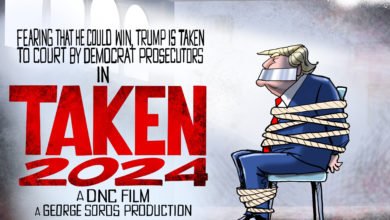Trump’s Budget Creates A Government Culture That Threatens Rights
Budget drafts are hardly written in indelible ink. By the time they pass from the executive through the legislature and return to the president’s desk, provisions have been added and funding has been stripped in accordance with various political agendas to such a degree that the final product bears little resemblance to the draft.
Rather, budget drafts are far more useful if viewed as ideological tracts. Major spending programs and the rationales given for their primacy go a long way towards revealing the proclivities of a president; they help set the tone for the culture of government which can be expected from a particular administration.
Bearing this in mind, there are a great many reason to be concerned about President Trump’s budget for the 2018 fiscal year.
There is a great deal of executive activism behind the president’s spending priorities. In fact, the entire budget is less an economic program than a proactive effort to cure the ills which Trump believes have beset America. The president himself positions the budget as the marshaling in of “a new foundation of focus on the forgotten American worker who now has an advocate in the Oval Office.”
The budget, then, is really a document outlining a plan of advocacy for American workers; it is not simply a plan for funding government services. There is a sentience operational in the budget; Trump sees himself as having an active role to play in advancing the welfare of the polity.
This is a problem, not because government has no stake in promoting the welfare of its citizens, but because it promotes a vision of what constitutes that welfare and attempts to achieve it by funding specific policies. As Trump explains in the introduction to the budget:
“As this Budget returns us to economic prosperity, it will also allow us to fund additional priorities, including infrastructure, student loan reform, and initiatives to help working families such as paid parental leave. We will champion the hardworking taxpayers who have been ignored for too long. Once we end our economic stagnation and return to robust growth, so many of our aspirations will be within reach.”
It is extremely pertinent to ask what exactly “our aspirations” are and why the government has a share in them. Trump’s language is that of a collective; the citizenry is bound together by the federal government and therefore has common interests. The president has positioned himself somewhat paradoxically both in and above the polity. He must have these dual roles. The ethos of his role as a champion of the blue-collar everyman depends on his ability to position himself within the “we” of neglected taxpayers. The success of his presidency depends on his ability to turn promises into facts.
It’s easy to see why Trump’s messaging within the budget is tantalizing to the right; there is much language which speaks to the feeling of inefficacy conservatives have long felt. But, all Trump’s promises to streamline government, cut waste and rollback job-killing regulations, are part of the broader culture of sentient protectionism with which the budget is impregnated.
Those cuts which are pursued are not done out of any sense that government, by its nature, is the real problem with America’s stagnation, but rather that bloat, mismanagement and corruption are preventing government from properly functioning. There is a sense that government can work well under the hawkish, paternal eye of Trump.
But government can only work so long as the public and private sectors follow along with Trump’s proscribed course of action. Nowhere is this so clear as in the section of the budget which deals with infrastructure.
Trump proposes a $1 trillion infrastructure program that uses a “combination of new Federal funding, incentivized non-Federal funding, and expedited projects that would not have happened but for the Administration’s involvement.” This, according to the president, is a priority because “the Nation’s infrastructure needs to be rebuilt and modernized to create jobs, maintain America’s economic competitiveness, and connect communities and people to more opportunities.”
To begin with, the willingness to spend federal dollars on infrastructure programs because Trump perceives these as being crucial to his priorities, namely bolstering business, belies the notion that this is a budget dedicated to fiscal restraint. The underlying principle determining what departments and initiatives receive funding is not needs-based. Nor does concern with waste, abuse or the appropriateness of federal control guide the allocation with money. Those programs close to the president’s heart are promoted, those that are not are discarded.
This is not a responsible budget but a catalogue of the personal ambitions of the president. It creates a culture where there is an implicit threat directed against those who stand between the president and the portion of the polity he has chosen to promote. Parity between citizens before the law is impossible when the president positions himself as the advocate for those he considers to be particularly disadvantaged.
This is a government that manages people as assets; it does not respect the rights of citizens. It cannot possibly do so because it identifies a specific vision of what constitutes national welfare, thus binding the people to the president’s will. Their good too easily becomes defined in terms of the national good, which is too bound up with the president’s own ideology. Government is too easily bent towards his own prejudices and desires, and this becomes masked in a veneer of altruistic morality. And this is a greater threat in the long-term than is whatever short-term economic growth might occur.




